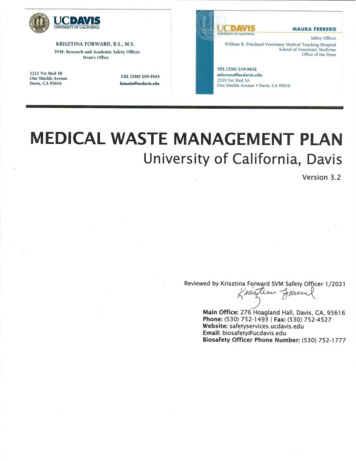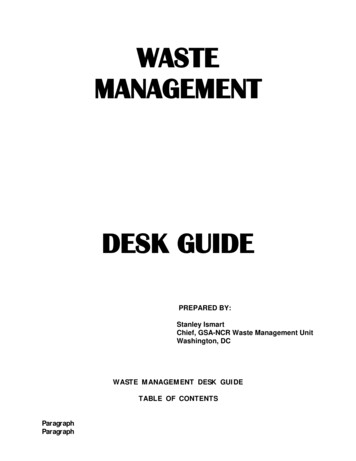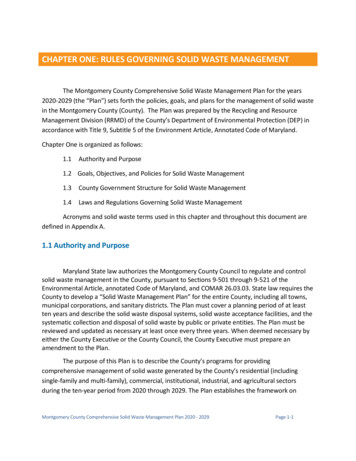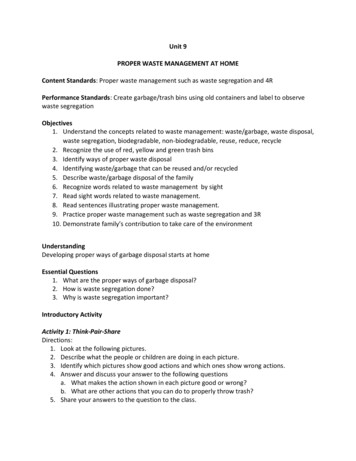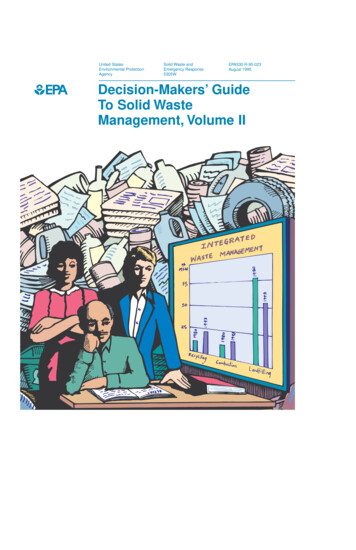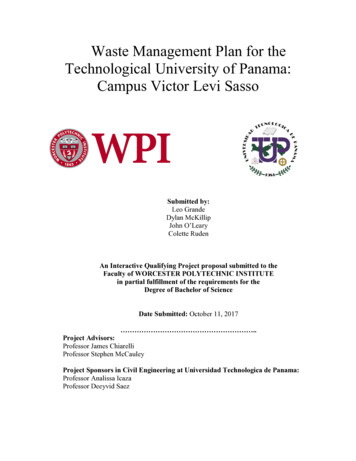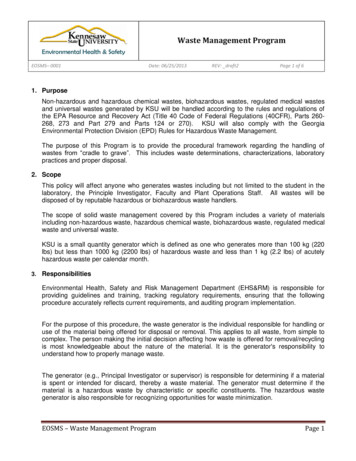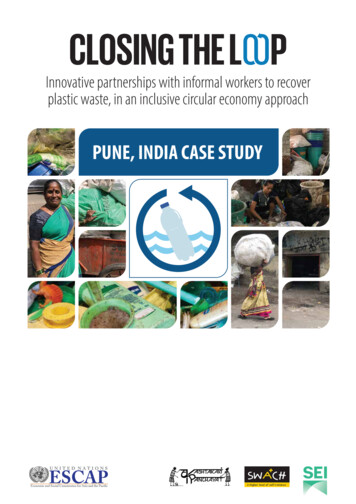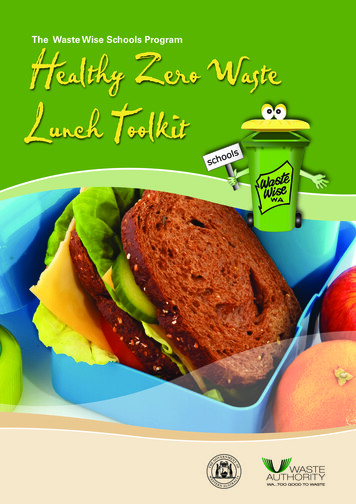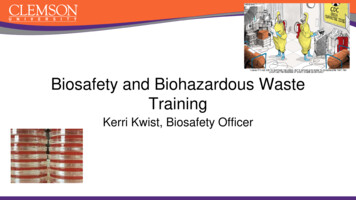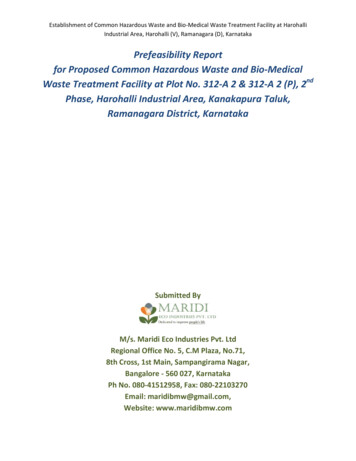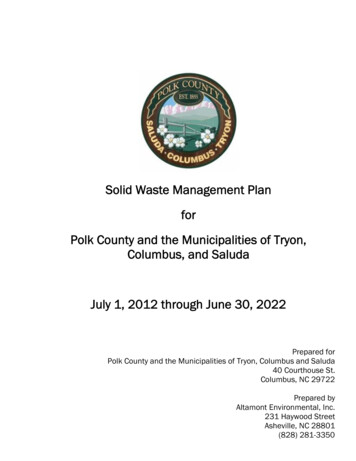
Transcription
Solid Waste Management PlanforPolk County and the Municipalities of Tryon,Columbus, and SaludaJuly 1, 2012 through June 30, 2022Prepared forPolk County and the Municipalities of Tryon, Columbus and Saluda40 Courthouse St.Columbus, NC 29722Prepared byAltamont Environmental, Inc.231 Haywood StreetAsheville, NC 28801(828) 281-3350
Solid Waste Management PlanPolk County and the Municipalities of Tryon, Columbus, and SaludaJuly 1, 2012 through June 30, 2022Page 1Table of Contents1.0Local Contacts . 42.0Public Participation. 63.0Waste Characterization . 74.0Local Waste Reduction Goals . 95.0Waste Handling Characterization . 116.0Solid Waste Management Methods: Assessment of Programs and Description of Intended Actions. 126.1Source Reduction . 126.2Collection of Solid Waste . 126.3Recycling and Reuse . 136.4Composting and Mulching . 146.5Incineration With/Without Energy Recovery . 156.6Transfer of Solid Waste Outside Geographic Area . 156.7Disposal of Solid Waste. 156.8Community and School Education . 156.9Special Waste Management . 166.9.1Household Hazardous Waste. 166.9.2Tires . 166.9.3Lead-Acid Batteries. 166.9.4White Goods . 166.9.5Electronics Management Program . 166.9.6Used Oil and Oil Filters . 176.9.7Abandoned Manufactured Homes . 176.10Illegal Disposal and Management of Litter . 176.10.1Illegal Disposal . 176.10.2Litter Control . 186.11Purchase of Recycled Materials and Products . 187.0Solid Waste Costs and Financing Methods . 198.0Emergency/Disaster Debris Management and Animal Mortality . 208.1Disaster Debris Management . 208.2Incidental Animal Mortality . 209.0Resolutions . 2110.0 Ordinances . 2511.0 Attachments . 26
Solid Waste Management PlanPolk County and the Municipalities of Tryon, Columbus, and SaludaJuly 1, 2012 through June 30, 2022Page 2TablesTable 1. Waste Reduction Goals: 2009 Update . 3Table 2. Waste Reduction Goals: 2012 Update . 3Table 3. Population as of July 2010. 7Table 4. Tryon Waste Stream FY 2010 to 2011 . 7Table 5. Columbus Waste Stream FY 2010 to 2011 . 8Table 6. Saluda Waste Stream FY 2010 to 2011 . 8Table 7. Combined Polk County Transfer Station Waste Stream FY (2010-2011) . 8Table 8. Waste Reduction Goals: 2012 Update . 9Table 9. Five-Year and Ten-Year Waste and Population Projections . 9Table 10. Targeted Waste Reduction, FYs 2012-13, 2017-18, and 2022-23 . 10Table 11. Top Five Waste Contributors at the Polk County Transfer Station FY 2010-11 . 13Table 12. Polk County Transfer Station Recycling County FY 2010-11 . 14Table 13. Polk County Solid Waste Fees and Funding . 19FiguresFigure 1. Polk County Solid Waste Facilities .5
Solid Waste Management PlanPolk County and the Municipalities of Tryon, Columbus, and SaludaJuly 1, 2012 through June 30, 2022Page 3Executive SummaryNorth Carolina (State) requires each unit of local government to establish a Ten-Year Solid WasteManagement Plan and update the plan every three years. The goal of these efforts is to reduce the wastestream in the State by 40 percent, when measured as tons per capita per year. Polk County’s initial TenYear Plan was prepared in 1997 and used the per capita generation rate in 1991 as the baseline.As a result, by 2000 many counties had not made significant progress towards the 40 percent goal. TheState modified the goal by allowing each county to establish individual waste reduction goals, as long as theindividual goals assisted the State as it strived toward an overall waste reduction goal of 40 percent. In2003, due to unforeseen increases in per capita waste volumes, the State agreed to allow Polk County(County) to change its baseline year from 1991 to 2001. As a result, the modified baseline number to bebenchmarked by Polk County is an annual disposal rate of 0.71 tons per capita. Therefore, reducing thebaseline by 40 percent yields a per capita disposal rate of 0.43 tons per year.The waste reduction goals for the 2009 Update were as follows:Table 1. Waste Reduction Goals: 2009 UpdateYearWaste Reduction Goal2009-25 percent2014-10 percent20190 percentThe waste reduction goals in Table 1 above reflect negative values for the 2009 and 2014 years. Thistranslates into reduction goals for those particular years being above the baseline number. In other words, a-10 percent reduction translates to a goal that is 10 percent above the baseline rate.The County continues to have difficulty meeting the State’s 40 percent reduction per capita goal of 0.43 tonsper year, as the calculated per capita disposal rate for the County in fiscal year (FY) 2010-2011 is 0.86 tons.However, this is a waste disposal reduction of approximately 26 percent from the per capita disposal rate ofFY 2007-2008. The reduction of solid waste disposal since FY 2007-2008 can be attributed to recent wastereduction and recycling programs.The 2012 waste reduction goals for Polk County are as follows:Table 2. Waste Reduction Goals: 2012 UpdateYearWaste Reduction Goal2012-10 percent20170 percent20225 percent
Solid Waste Management PlanPolk County and the Municipalities of Tryon, Columbus, and SaludaJuly 1, 2012 through June 30, 2022Page 41.0 Local ContactsPolk County encompasses an area of approximately 239 square miles that is located in the foothills of theBlue Ridge Mountains of Western North Carolina in the transitional area between the Piedmont and themountains. Therefore, the topography changes from mountainous areas in the north to rolling foothills inthe south.There are three municipalities in the County: Columbus (county seat), Saluda (portion located in PolkCounty), and Tryon. Polk is a rural county with most of the residents living in unincorporated areas of theCounty. Interstate 26 runs north to south through the County and NC Highway 108 runs east to west. USHighway 74 runs east to west through the southeastern quadrant of the County.Polk CountyTown of ColumbusMr. Neal HallSolid Waste DirectorPolk County Solid Waste DepartmentPost Office Box 30840 Courthouse SquareColumbus, North Carolina 28722nhall@polknc.org(828) 894-3737Ms. Ernie KanCouncilwomanColumbus Town Council95 Walker StreetColumbus, North Carolina 28722ernie@columbusnc.com(828) 894-8236Town of TryonCity of SaludaMr. Roy MillerMayor Pro TemporeTryon Town Hall301 North Trade StreetTryon, North Carolina 28782royski@windstream.net(828) 859-6655Ms. Lynn CassCommissionerSaluda City CommissionPost Office Box 248Saluda, North Carolina 28773lynncass@tds.net(828) 749-2581Figure 1 shows the locations of solid waste management facilities within Polk County.
Solid Waste Management PlanPolk County and the Municipalities of Tryon, Columbus, and SaludaJuly 1, 2012 through June 30, 2022Page 5Figure 1. Polk County Solid Waste Facilities
Solid Waste Management PlanPolk County and the Municipalities of Tryon, Columbus, and SaludaJuly 1, 2012 through June 30, 2022Page 62.0 Public ParticipationThis plan was developed by the creation of a Solid Waste Management Plan Committee and by publiccomment. The committee was composed of a representative from Polk County, Town of Columbus, Town ofTryon, and the City of Saluda. These committee members initially met to discuss the aspects of the SolidWaste Management Plan. Each Committee member spoke with the local contacts within each jurisdictionand public participation was solicited regarding the draft plan.The draft plan was presented at commissioner meetings for each unit of local government, and publiccomment was solicited at each of the commissioner meetings. Following the public meetings, a draft planwas posted on the Polk County webpage. A link on the webpage was provided for the public to providecomments.
Solid Waste Management PlanPolk County and the Municipalities of Tryon, Columbus, and SaludaJuly 1, 2012 through June 30, 2022Page 73.0 Waste CharacterizationPolk County and its municipalities disposed of approximately 17,775 tons of municipal waste during the FY2010-2011. The populations of each municipality and the unincorporated areas are shown in Table 3below. The 2010 population for Polk County was 20,588. This translates to a per capita annual disposalrate of 0.86 tons. These estimates are based on information obtained from scale records, members of thestaff, and subcontractors of both the County and the incorporated areas of the County, as well as calculatedaverages.Disposal at the Polk County Construction & Debris (C&D) Landfill ceased in 2006 and has since become partof the MSW calculations. Therefore, for this plan, waste characterization includes the following: Municipal solid waste Reduction, reuse, and recycling Mulching and composting (if applicable)Due to the lack of industrial activity in recent years, Polk County has observed a negligible amount ofindustrial waste at the Transfer Station.Table 3. Population as of July 2010Municipalities & rtion located in Polk County703Polk County—unincorporated areas17,230TOTAL20,588Source: North Carolina Office of State Budget and ManagementTable 4. Tryon Waste Stream FY 2010 to 2011Type of WasteTonsPercentage of Waste StreamMunicipal Solid Waste683.6055 percentRecycling190.1515 percentMulching, Composting372.8230 percentTOTAL1,246.57100 percentSource: Tryon Annual Report to the State
Solid Waste Management PlanPolk County and the Municipalities of Tryon, Columbus, and SaludaJuly 1, 2012 through June 30, 2022Page 8Table 5. Columbus Waste Stream FY 2010 to 2011Type of WasteTonsPercentage of Waste StreamMunicipal Solid Waste251.1043 percentRecycling47.328 percent(500 pounds [lbs]/cubic yardestimated)281.2549 percentTOTAL579.67100 percentMulching, CompostingSource: Columbus Annual Report to the StateTable 6. Saluda Waste Stream FY 2010 to 2011Type of WasteTonsPercentage of Waste StreamMunicipal Solid Waste604.58100 percentTOTAL653.79100 percentSource: Calculated Tonnage Using 0.86 Tons per Capita and Population of SaludaTable 7. Combined Polk County Transfer Station Waste Stream FY (2010-2011)Type of WasteTonsPercentage of Waste StreamMunicipal Solid Waste17,775.1793 percentReduction, Reuse, Recycling848.314 percentMulching, Composting600.003 percentTOTAL19,223.48100 percentSource: Polk County Annual Report to the State
Solid Waste Management PlanPolk County and the Municipalities of Tryon, Columbus, and SaludaJuly 1, 2012 through June 30, 2022Page 94.0 Local Waste Reduction GoalsThe 2012 waste reduction goals for Polk County are as follows:Table 8. Waste Reduction Goals: 2012 UpdateYearWaste Reduction Goal2012-10 percent20170 percent20225 percentTable 9. Five-Year and Ten-Year Waste and Population ProjectionsYearPopulationDisposed (tons)TonsperCapitaPer rojected PopulationProjected DisposalFY 2012-1320,46815,9650.78-10 percentFY 2017-1820,50314,5570.710 percentFY 2022-2320,53813,7600.685 percentFrom Baseline YearSources: Population figures from NC Office of State Budget and Management, and Baseline Year per capitarate provided by NC Solid Waste Section. FY 1991-92 and FY 2001-02 data from previous Solid WasteManagement Plans.The waste reduction goals can be converted from percents to tonnage goals by a simple calculation that isillustrated in Table 10.
Solid Waste Management PlanPolk County and the Municipalities of Tryon, Columbus, and SaludaJuly 1, 2012 through June 30, 2022Page 10Table 10. Targeted Waste Reduction, FYs 2012-13, 2017-18, and 2022-23CalculationsFY 2012-13FY 2017-182022-231. Baseline year per capita disposalrate (FY 2001-02 per capita disposalrate)0.710.710.712. Targeted per capita disposal rate forFYs 2012-13, 2017-18, and 2022-230.780.710.683. Projected population for July 2013,July 2018, and July 202320,46820,50320,5384. Projected tonnage for disposal in FYs2012-13, 2017-18, and 2022-23 at theFY 2001-02 disposal rate of 0.71tons/year/cap (multiply line 1 by line 3)14,53214,55714,5825. Targeted annual tonnage fordisposal by FYs 2009-10, 20014-15,and 2018-19 at targeted goal rate(multiply line 2 by line 3)15,96514,55713,9666. Targeted annual tonnage reductionby FYs 2009-10, 20014-15, and 201819 (subtract line 5 from line 4)-1,4330616Sources: Altamont Environmental and the North Carolina Department of Environment and Natural Resources(DENR) Solid Waste Section
Solid Waste Management PlanPolk County and the Municipalities of Tryon, Columbus, and SaludaJuly 1, 2012 through June 30, 2022Page 115.0 Waste Handling CharacterizationThe Polk County Transfer Station, located in Mill Springs, accepts municipal solid waste (MSW), C&D waste,industrial waste, yard waste, household hazardous wastes, tires, electronics recyclables, used oil, whitegoods, and various other recyclables. The waste stream is taken to Polk County Transfer Station either byindividual vehicles or by private haulers. The MSW, C&D, and industrial wastes are compacted into 48-footlong, 8-foot-wide, and 8-foot-high trailers and transferred to the Upstate Regional Landfill by RepublicServices, Inc. The yard waste, household hazardous wastes, tires, electronics recyclables, used oil, whitegoods, and various other recyclables are taken to various destinations for appropriate disposal, recycling, orreuse.The Polk County Transfer Station also contains a small Type 3 composting area and a treatment andprocessing area for land clearing debris.Tryon provides residents with a town-operated curbside pickup of garbage and recyclables. Saluda contractswith a private hauling company to pick up residential waste and recyclables. Columbus contracts with aprivate hauling company to conduct weekly pickup of residential and small commercial businesses.
Solid Waste Management PlanPolk County and the Municipalities of Tryon, Columbus, and SaludaJuly 1, 2012 through June 30, 2022Page 126.0 Solid Waste Management Methods: Assessment of Programs andDescription of Intended ActionsEach solid waste management method as required by North Carolina G.S. 130A-309.09A(b) is describedbelow. Each section includes an assessment of the current program and a summary of the intendedactions.6.1Source ReductionCurrent Program:Polk County and its municipalities continue to promote source reduction through local programs andeducation. In programs presented to school classes and other groups, source reduction is stressed as aprimary method of management of solid waste. Education of the public through pamphlets and localnewspapers is a significant effort for source reduction.The Polk County Transfer Station operates a beneficial fill area in accordance with 15A NCAC 13B .0562.The separation of beneficial fill material from the waste stream has reduced tonnages of these materialsfrom the Transfer Station waste stream.Local programs include the “Going Green” initiative at the Blue Ridge BBQ & Music Festival held annually inTryon, and various swap shops around the County.Intended Actions:Polk County intends to continue public education regarding source reduction and procure grant money tooperate a swap shop at the Polk County Transfer Station.6.2Collection of Solid WastePolk County is not franchised, and the County does not provide waste collection services. Therefore, privatehaulers compete in an open market. Waste that is collected in the County may be delivered to the PolkCounty Transfer Station, or taken to a properly licensed and regulated disposal site outside of the County.Tryon provides residents with a town-operated curbside pickup of garbage and recyclables. Saluda contractswith a private hauling company (currently All Bright Sanitation) to pick up residential waste and recyclables.Columbus contracts with a private hauling company (currently All Bright Sanitation) to conduct weekly pickupof municipal solid waste and recyclables from residences and small commercial businesses.Annual residential permits are currently sold for 75.00 each to County residents. If a permit is notpurchased, a user fee of 7 is charged per visit.Table 11 below illustrates the major contributors of waste to the Polk County Transfer Station.
Solid Waste Management PlanPolk County and the Municipalities of Tryon, Columbus, and SaludaJuly 1, 2012 through June 30, 2022Page 13Table 11. Top Five Waste Contributors at the Polk County Transfer Station FY 2010-11HaulersWaste (tons)All Bright Sanitation10,431Republic Services, Inc.1,434Town of Tryon727Bradley164Hannon92Source: Polk County Solid Waste DepartmentIntended Actions:Polk County continues to monitor waste haulers to ensure compliance with State regulations. A program hasbeen set in place in the event that all commercial waste haulers, including haulers of C&D material wouldneed to be licensed.6.3Recycling and ReuseCurrent Program:All three municipalities provide residences with weekly recycling pickup.The County operates a new mobile recycling program that has been implemented in recent years. Recyclingbins are provided for the public to use, and a dedicated hauling truck has been purchased by the County totake the recyclables to the Transfer Station. The mobile recycling program includes four weekly pickuplocations at the three municipalities, the Green Creek community, four schools, and other miscellaneousbusiness locations as needed.The County recycling center is located at the Transfer Station. The County utilizes a “dual-stream” programthat allows material to be grouped into two broad categories: containers and fiber. The County believes thatthe dual-stream program is easier for its citizens to use, and will result in greater participation rates, henceimproving waste reduction. Fiber includes newspaper, magazines, corrugated cardboard, office ledger, andmixed paper. Containers include clear, green, and brown glass, aluminum cans, steel cans, and #1 and #2plastic containers.Metal: The County currently contracts with Tri City Recycling for the removal of metals. The County hasstopped piling metal at an open disposal site near the closed C&D landfill, and now stores the metal in acovered metal container. When this container is full, Tri City Recycling hauls the metal away.Containers and Fiber: Sonoco Recycling collects containers, fiber, and other recyclables.Wood Waste: Untreated wood waste is stockpiled until sufficient quantity exists to warrant grinding. Mulch isthen made available to the public.Table 12 illustrates the combined recycling tonnages from the municipalities and the County.The Town of Columbus utilized RE-mus the Recycler in pamphlets and education efforts for its citizens, andhas provided the pamphlet to the other municipalities and the County.
Solid Waste Management PlanPolk County and the Municipalities of Tryon, Columbus, and SaludaJuly 1, 2012 through June 30, 2022Page 14Table 12. Polk County Transfer Station Recycling County FY 2010-11MaterialCounty TotalsGlass—clear123.39 tonsGlass—brown35.27 tonsGlass—green17.63 tonsPlastic—PETE13.22 tonsPlastic—HDPE6.61 tonsAluminum cans8.81 tonsSteel Cans15.42 tonsWhite goods and other metals307 tonsMixed Paper (includes OCC)320.96 tonsTires159.73 tonsMulch600 tonsBatteries, lead acid48 batteriesBatteries, dry cell60 lbsOil3,723 gallonsSource: Polk County Annual Report to the StateIntended Actions:The County and municipalities intend to increase public education efforts through pamphlets and localnewspapers.6.4Composting and MulchingCurrent Program:The Polk County Transfer Station has a recently permitted Type 1 compost facility. This facility has helpedexpand the composting operations beyond the Blue Ridge BBQ & Music Festival program. The County hasalso sent staff to intensive training in vermaculture.The County has also partnered resources with the local Soil and Water Conservation District and 4Hprograms to promote residential composting.The County has created a mascot named “Earl the Compost Worm” that visits the local schools to educatestudents about the benefits of composting.Intended Action:The County will continue to use the existing composting facility at the Transfer Station and provide outreachto the citizens of Polk County regarding composting operations by teaming with the local CooperativeExtension office to provide composting workshops to the public.The Town of Columbus will publish a brochure to educate the public on proper methods of composting,coordinate with the local 4H vermaculture program, and attend a Transition Group with representatives fromeach county to promote composting activities.
Solid Waste Management PlanPolk County and the Municipalities of Tryon, Columbus, and SaludaJuly 1, 2012 through June 30, 2022Page 15The Saluda Community Land Trust is a local organization that will continue to educate and promote the useof residential composting.6.5Incineration With/Without Energy RecoveryCurrent Program:Incineration is not currently part of the County’s solid waste management program.Intended Action:There are no plans for the County to create an incineration program.6.6Transfer of Solid Waste Outside Geographic AreaCurrent Program:Polk County transfers all MSW delivered to the Polk County Transfer Station to the Upstate Regional Landfillusing Republic Services, Inc. in South Carolina.Intended Action:Polk County plans to continue with this method, while evaluating other options.6.7Disposal of Solid WasteCurrent Program:The Polk County Landfill, which accepted MSW, closed on April 1, 1994. The C&D landfill closed in 2006.Therefore, MSW and C&D are collected at the Transfer Station and disposed of outside of the County at theUpstate Regional Landfill by Republic Services, Inc. According to the 2011 South Carolina Solid WasteManagement Annual Report, the estimated remaining life of the existing permitted areas of the landfillbased on current disposal rates is 6.4 years. However, vertical expansion and future permitting of newlandfill cells that would adequately meet the needs of Polk County beyond the existing permitted landfill cellsis planned.Intended Action:The County will continue to use this disposal location, while evaluating other options.6.8Community and School EducationCurrent Program:The Polk County Recycling Committee has been created to provide outreach and community activitiesrelated to recycling and reuse. This committee provides various appearances at the local school to discusssolid waste management issues with the students and school staff. The education material is related to theservices that the County offers its citizens.The Town of Columbus provides a brochure that describes the basics of recycling to residents as they paytheir water bills. The Town of Columbus provides a brochure that describes the basics of recycling toresidents as they pay their water bill, and utilizes RE-mus the Recycler as a mascot to help with communityeducation and outreach. The County has also created a mascot named “Earl the Compost Worm” that visitsthe local schools to educate students about the benefits of composting.
Solid Waste Management PlanPolk County and the Municipalities of Tryon, Columbus, and SaludaJuly 1, 2012 through June 30, 2022Page 16Intended Action:The County plans to continue the education and outreach efforts in the future. The City of Saluda plans toinclude solid waste education materials in the local paper and distribute educational brochures at the localschools.6.9Special Waste Management6.9.1Household Hazardous WasteCurrent Program:The County will only accept household hazardous wastes within the limits of homeowners’ quantities.However, homeowner quantities of household hazardous wastes are accepted during normal business hoursat the Transfer Station.Intended Action:The County intends to continue this program.6.9.2TiresCurrent Program:Tires are shipped approximately once per month by US Tire in Concord, NC. There is no charge by the Countyfor the disposal of scrap tires. No tires are accepted from outside of Polk County.Intended Action:The County will continue this program.6.9.3Lead-Acid BatteriesCurrent Program:Batteries are stored at a specified location at the Transfer Station and removed by the local Carquest AutoParts , which is a certified battery handler, approximately once per week. The batteries are stored in alocked compartment and the number of batteries is tracked by Polk County.Intended Action:Polk County intends to continue this program.6.9.4White GoodsCurrent Program:White goods are accumulated at the Transfer Station. Polk County contracts with Tri City Recycling toprovide pick up and recycling of this material. Tri City Recycling also reclaims chlorofluorocarbons (CFCs)and drains the necessary oils and lubricants from these items. Tri City Recycling provides Polk County with aCFC removal report.Intended Action:Polk County intends to continue this program.6.9.5Electronics Management ProgramThe existing electronics management program in Polk County to recycle or reuse discarded computerequipment, televisions, and other electronic devices includes the following program elements:
Solid Waste Management PlanPolk County and the Municipalities of Tryon, Columbus, and SaludaJuly 1, 2012 through June 30, 2022Page 17 Electronics waste (including but not limited to computers, monitors, peripherals, televisions, cablewire, and circuit boards) is accumulated at a permanent collection site at the Transfer Station andconsolidated in dry storage on-site. The County
Polk County and the Municipalities of Tryon, Columbus and Saluda 40 Courthouse St. Columbus, NC 29722 Prepared by Altamont Environmental, Inc. 231 Haywood Street Asheville, NC 28801 (828) 281-3350 Solid Waste Management Plan for Polk County and the Municipalities of Tryon, Columbus, and Saluda July 1, 2012 through June 30, 2022
